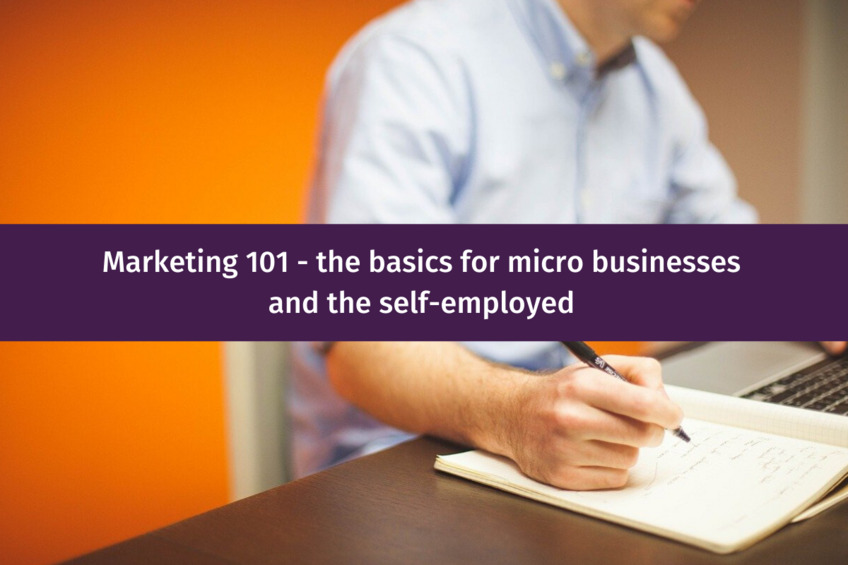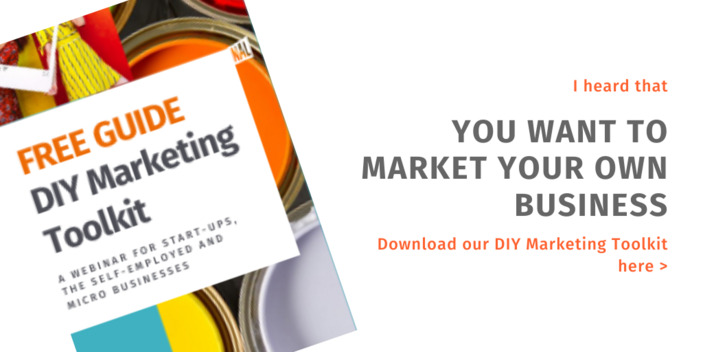All Posts
SALES & MARKETING
Marketing 101 – The basics for micro businesses and the self-employed
16-03-2020

As a small business, whether you run a limited company or work as a sole trader, you need to attract customers and retain them. That's what marketing is all about, attracting prospective customers, converting them into leads, closing sales and then engaging them again and again so you're their first port of call for further services or products.
However, there are a multitude of marketing techniques and countless marketers out their offering their services. How do you know what is the best approach for your small business and whether you will get a good return on investment if you pay for marketing services?
Unfortunately not everyone purporting to be a 'marketing expert' has your best interests at heart. Some want to pile it high by selling one-size-fits-all solutions that don't address your customers' needs or the environment you operate in. While others forget that small businesses have limited budgets and can't avoid the same customer acquisition costs as big brands.
That's why our focus at the SiGNAL BiZHUB is on sharing best practice and tried-and-tested marketing techniques that work for us; small business owners and the self-employed who don't have limitless resources but still need to develop our own unique marketing strategies.
SiGNAL's marketing basics
The points below offer a crash course in marketing to help you identify the best approach for your business, spot the charlatans out there who just want your cash, and develop a sustainable marketing strategy for your small business:
1. What is marketing?
Marketing starts with market research. Even before you've got a product or service on the table you need to engage your marketing nous! That's because you should only be bringing products and services to market if they meet the needs and desires of your customers.
Marketing is about pricing. As well as delivering the right products and services you also need to deliver them at the right price point. This has to be a sustainable price: one that gives you the profit margins needed to run a viable business, and one that is pitched right to drive sufficient volume of sales.
Marketing is about choosing the right channels for your business. Not every business needs to be on every social media channel, run PPC campaigns, blog, advertise in local newspapers, push flyers through letterboxes or even have a website. You need to choose the right channels and engagement methods for your target customers. So when a social media expert or other marketing professional say you 'must' do x,y,z without finding out anything about your business, customers and products; ask them exactly how this will really help your business and what the expected ROI and results would be.
Marketing is about your customer journey. If you haven't got the right processes set up to deal with marketing engagement, you risk leaving money on the table. For example, don't invest in lead generation if you haven't got enough resources to follow up. For every interaction a potential customer has with your business you need to deliver the right experience and know what the next step is that will help convert them into a sale.
Marketing is also about customer retention. The saying goes that it's easier (and cheaper) to sell to an existing customer than attract and convert a new customer. Marketing should also be about engaging existing customers, upselling products and services, building customer relationships and turning them into brand advocates - so you can reach more potential customers through them.
2. Knowing your customers
Marketing becomes so much easier when you know your customers. This March at the SiGNAL BiZHUB we have looked at developing customer avatars and mapping your customer journey so you can really identify the strategies and channels that will work effectively - and those that won't.
Keep in mind these basics when you design marketing campaigns for different customers:
- What is valuable about your product / service to your target customers?
- What are the motivating factors that will close a sale?
- What are the barriers you / they may need to overcome to close a sale?
- What added benefits or value will attract your target customers?
- What type of customer experience will engage your target customers most?
Use these points to develop your marketing materials and ensure your messaging and approach is aligned with the answers.
3. Audit your existing marketing
If you're engaging in marketing activities that are not delivering the results you want, consider the following points:
- Are you marketing the right products or services at the right target customers?
- Do you know your target customers well enough to identify the key messaging that will engage them most?
- Are you using the right marketing channels for your target customers and the type of product or services you are marketing? For example, just because your target audience is on Facebook, doesn't mean they necessarily want to engage in B2B sales on this platform.
- Are your lead generation activities delivering sufficient value to convert prospects into leads? Target customers will only share their contact details if they think your lead gen is worth it.
- Is your brand messaging consistent across all your touchpoints with customers? If it's not it can be confusing and customers may struggle to understand who you are, your brand values and the reasons they should engage with your brand.
- Are you delivering the customer experience you promise, adding value and converting customers into brand advocates?
As many small business owners and self-employed people start off marketing their businesses by themselves, we've created a DIY Marketing Toolkit just for you!
In it we recommend free tools and apps that can help you create and manage your marketing content, share tips for building effective marketing funnels and creating lead generation content, and explore how to get save time and lessen the burden of managing multiple platforms and marketing activities.








